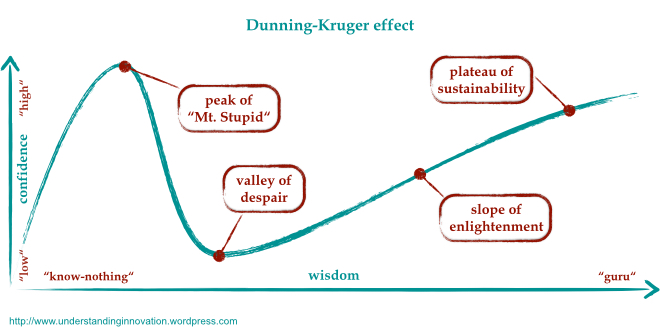Children of the Internet

The above picture is one I've been using since I got here in 2017.
Of course many times that I was using it (baby steps for how to improve Steem) the ideas and words that I was putting to paper were often not very good. Turns out I did not know everything the moment I dropped down here from my corner of the Internet. Actually there's a name for this exact thing. It's called the Dunning-Kruger effect.

This is a very common psychological outcome.
Say it takes 5000 hours to become an expert on any given topic or perhaps even a skill (like music or martial arts). 100 hours into our studies we might feel like we are already experts and have it all figured out. Our confidence will reflect this, and hubris kicks in. We end up saying and doing some very stupid things due to this unearned overconfidence. It's only by getting proven wrong over and over while getting outclassed by others with more experience do we realize we have a lot more to learn.
I have plans to write an entire post about Cunningham's Law and a few other subjects, but it's also relevant to this topic as well. Cunningham's Law states that the best way to get the right answer isn't to ask a question, but to confidently post the wrong answer. This is something I figured out quite quickly during my blogging experience: being aggressively wrong led to all kinds of engagement and extremely useful information being posted in the comments. Considering Ward Cunningham was the inventor of wiki software, clearly he was onto something.
Meme Law: Cunningham & Poe
I did this most recently with my post about a fake attack vector on Hive. I knew that this threat couldn't exist, but I didn't know why, so I just wrote it as if it did exist and employed some fake outrage. Lo and behold, I instantly got the exact answer I was looking for in the comments (which was being able to derive an account name from a signature on Hive). Surely there are a dozen more examples of me employing this strategy within my blog (buried within hundreds of posts of course).
At the end of the day it's very easy to trigger people on the internet and bait them into performing certain actions. Troll culture has been a thing for quite a while. However, many of these tactics were completely unknown when the Internet first began, but now entire brands are built off of this kind of engagement.

Tone-Deaf Sarcasm Taken Seriously: The Most Popular Twitter Brand
This was going to be the title of another post, but hell might as well just wrap it into this one. Like I said, influencers literally make money off of engagement farming. The psychology of it all is much more known today than it was even a decade ago, to the point of being able to manipulate curation algorithms and game the system in ways never even thought possible.
https://twitter.com/3YearLetterman/status/1653528347215798279
Jesus was a great American who literally wrote the Bible.
But you can't say that anymore without upsetting people.
omfg the comments on this guy's posts
This brings us to Poe's law.
Poe's law is an adage of internet culture saying that, without a clear indicator of the author's intent, any parodic or sarcastic expression of extreme views can be mistaken by some readers for a sincere expression of those views.
Poe's law is used by influencers on purpose for engagement farming and getting more attention within the attention economy. All publicity is good publicity; doesn't matter if people are mad about it. In fact, the polarization of the argument is what causes these things to go viral in the first place more often than not.
https://twitter.com/DrAnitaBEtin/status/1621155870238466049
Anita B. Etin
This account on Twitter is extremely deadpan. It's fooled a lot of people into thinking the 'obviously' sarcastic posts are fully serious. In fact I would have been tricked as well if I hadn't noticed that the only reason I was seeing this content is that @r0nd0n was liking the posts. Given my knowledge of his politics it was instantly obvious that this account was a parody, but it would not have been that obvious otherwise... even with a Twitter handle that is literally pronounced Anita Be Eating.
What was I talking about again?

Imposter Syndrome.
Once we reach the "valley of despair" we come to realize that the 'mountains' we were conquering before were just tiny little foothills. True wisdom is often realizing how little we know about a topic even after training for hundreds of hours. Imposter Syndrome can be thought of as sort of the opposite of the "peak of Mt. Stupid". Rather than overestimate our abilities we reach a point in which we tend to underestimate them and our worthiness for our current position.
Some will suffer from imposter syndrome more than others. Know-it-alls will never suffer from it and are perpetually at the peak of Mt. Stupid; constantly playing the fake-it-till-you-make it game with whatever the current topic of discussion may be. Needless to say that's not a great place to be in order to experience actual growth. Ironically the biggest gains are the result of failure. Of course for that growth to actually occur we have to admit that a failure occurred in the first place, which know-it-alls never do.
Conclusion
Interestingly enough this post got completely derailed and was actually supposed to be about my 6000 account token milestone and a reminder of the importance of Hive's future along with the limitations of bandwidth and scaling. Guess I'll have to save that one for another day, eh?
In any case Internet psychology is quite interesting. The anonymity and digital nature of the Internet remove the filter of the real world and often allows people to say and do whatever they want. This can be an enlightening experience, or it can be some 12 year old acting like some completely untouchable mercenary. Although I suppose the two are not mutually exclusive.
The Dunning Kruger Effect, Poe's Law, Cunningham's Law, and Impostor Syndrome are relatively new psychological assessments. They are children of the internet, with most of them being coined around the early 2000's and impostor syndrome coming around long after women joined the workforce. These are very short time periods when you think about it. The Internet has changed our very psychology in numerous ways that we aren't even close to understanding yet.
Do not fear the valley of despair.
It's Only Up from here.
It's crazy to consider the ways in which human psychology is influenced by the digital realm and how it shapes our perceptions, interactions, and even our self-worth.
It's true that imposter syndrome affects individuals differently, with know-it-alls perpetually residing at the peak of Mount Stupid, constantly engaging in the "fake-it-till-you-make-it" game.
I agree that that true growth occurs through failure and the willingness to admit our shortcomings.
In the real sense, the digital world has opened up new avenues for self-expression, connection, and learning. But it has also exposed us to unique challenges and opportunities for personal development.
We can choose which side to embrace for our own good.
Congratulations @edicted! You have completed the following achievement on the Hive blockchain And have been rewarded with New badge(s)
Your next target is to reach 570000 upvotes.
You can view your badges on your board and compare yourself to others in the Ranking
If you no longer want to receive notifications, reply to this comment with the word
STOPCheck out our last posts:
Oh I have come across my fair share of these people over the years!
The Dunning Kruger Effect was not something I heard of before, but it makes a lot of sense, the slope of enlightenment can be long and challenging, but the reward at the end in being a true expert is brilliant I imagine. I have lots of interests and areas that I know about, but I am nowhere near the end of the Dunning Kruger Effect cycle for any of them yet, some day..
Wow, this is some valuable information I never found any where else; thanks for sharing.
Amen. This is why I covet criticism, yet fiercely hold my ground until factual evidence disproves my thesis. Then I immediately abandon my hard fought position, because regardless of how clever I might argue, I'd still be wrong if I didn't change my mind. I am happiest when I've been proved wrong, and become able to correct that problem. That last thing I want is to tackle a dangerous world misunderstanding the situation.
Thanks!
The internet has created a new pattern of behaviour. I think the "laws" you have identified explain some of them. I mostly agree with the first law of Dunning-Kruger, where people are less knowledgeable than they think. Everybody on the internet thinks they are experts and that they know the hidden truth of a certain subject. This overconfidence can sometimes be very annoying. Thanks for an insightful article.
We got a saying here:
"The wise man has doubts, the stupid one is always sure about knowing everything."
Not an island of knowledge as I am among those who want to learn and grow. We will surely meet with the "Dunning-Kruger Effect" people than those who understands the "Cunningham's law" and wanting to improve to learn more. Most people have suffered from imposter syndrome and lose their self esteem by the know-it-alls candidates. That is the Internet and people for you. They believe they have mastered all but are the worst stupid people especially when they aren't ready to learn or get corrected. Before we can get to the peak of achieving great result and success, we would surely fail. This shouldn't scare us because it means we are growing and not like the know-it-all peeps.
Thanks for sharing this information.
Certainly psychology plays a leading role when we write our posts, because everything is about attracting the attention of readers to our content, since that will ultimately make them successful.
Those psychological tactics that you mention have a great impact on the behavior of the people who read what we write, generating feelings of hate or love in readers. But certainly no such a thing as is bad interaction, there are only interactions and content that attracts attention vs content that does not attract attention.
My apologies, the comment came out repeated due to a system error and I couldn't delete it.
By the time I realized, the comment had been posted three times and the system wouldn't let me delete it. My apologies for the inconvenience.
Congratulations on the 6000th acount token.
I have read those articles about the amount of hours to truly master a subject, and like you I have been writing for years here seeking to learn and expose what I have learned to others who may know more.
It has been a amazingly interesting journey, which although it has not been without it's share of frustrations and annoyances.
The knowlege I have gained here has been humbling, the rage and anger contained within the personas of some of the people here has been shocking.
I am anatomically limited to my own point of view, but I have the self awareness to realize it, and sometimes seek guidance from those with a different one.
Write on, learn on, and good luck with the crazies.